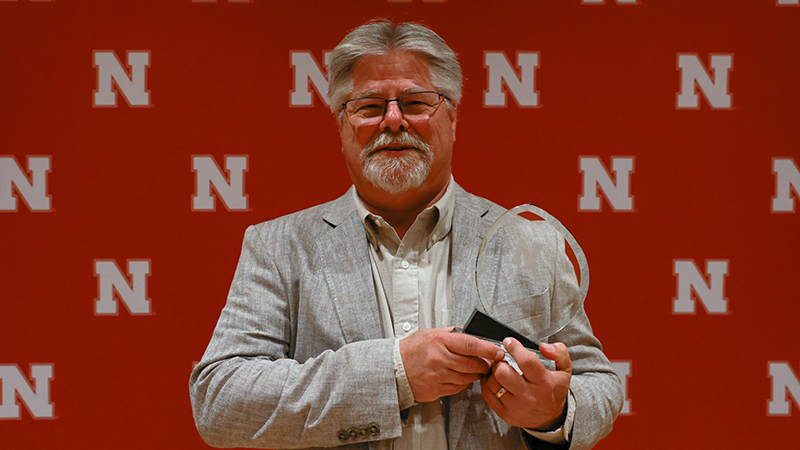Posted: 7/22/2025
Vrtiska wins early career award with experience of a lifetime
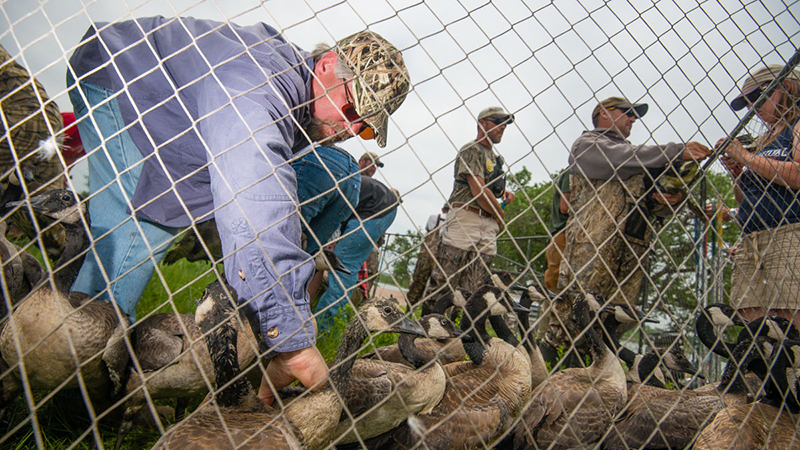
By Ronica Stromberg
Mark Vrtiska's win of the 2025 Early Career Faculty Award in the School of Natural Resources may be one for the record books.
"It is early career in terms of what I'm doing now, but I sent Larkin Powell [director of the school] an email saying, 'I've got to be the oldest individual to ever receive this award,' so I think I'll have a longstanding record from that standpoint," Vrtiska said.
At 61, the professor of practice recently finished his fifth year at the University of Nebraska–Lincoln but had almost a lifetime of career experience before starting teaching in the School of Natural Resources.
He had worked at the Nebraska Game and Parks Commission the prior 21 years, Ducks Unlimited for three years before that and various waterfowl jobs throughout college and the year between his undergraduate studies at Nebraska and graduate studies at Eastern Kentucky University and Mississippi State University.
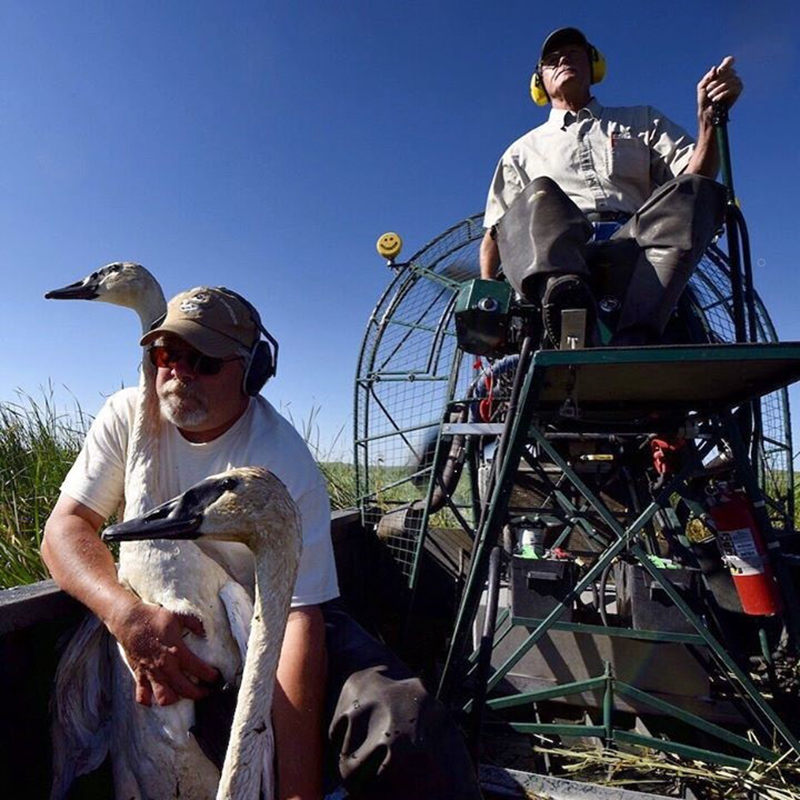
He now regularly instructs the Natural Resources Orientation for freshmen, three classes on wildlife management techniques and a Waterfowl Ecology and Management class. He also coordinates the Tern and Plover Conservation Partnership to protect interior least terns and piping plovers. These birds historically laid their eggs on sandbars on the Platte River but with reduced habitat, they began laying their eggs on sand near the Platte. The birds became endangered or threatened as they lost more eggs to predation or trampling.
Vrtiska, two technicians and a graduate student search sandy lands near the Platte for the eggs and flag nesting areas. This helps private landowners, developers and sand and gravel operations in the partnership avoid running over the eggs and incurring fines.
"It's actually one of those things that's a solution that everybody wins," Vrtiska said. "The Tern and Plover Conservation Partnership helps the sand and gravel operations, the housing developments and other landowners look out for these birds."
The land-owning partners avoid having to hire anyone to search for nests because the partnership hires the technicians and the Nebraska Game and Parks Commission funds the student. For about 20 years, seasonal technicians and students have gained employment experience from late April into the summer through the conservation work.
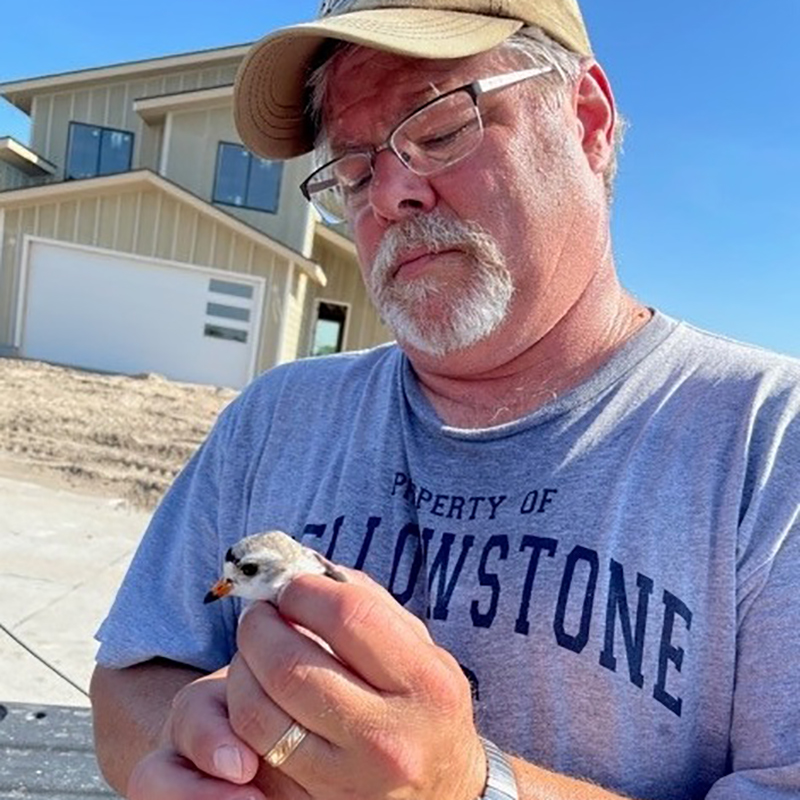
Vrtiska said he has had fun learning about this different group of birds. Growing up near Beatrice, he had hunted pheasants and quail and read extensively about ducks and geese.
"Southeast Nebraska is not a mecca of waterfowl hunting by any stretch," he said. "And so, I was basically already in the career of waterfowl before somebody took me on my first waterfowl hunt."
His first hands-on experience studying waterfowl came as an undergraduate volunteer at the Medicine Lake National Wildlife Refuge in northeast Montana in 1985. He and other students looked for duck nests to track their hatching success and counted pelicans, cormorants and other birds.
"I had no idea ducks nested on the ground," he said. "I just remember we'd find a duck nest, and—bam—it's like, 'Man, this is so cool,' and it just kind of set its hooks into me."
He worked with a graduate student studying Canada geese and avian botulism and began forming an idea of what earning a master’s degree might look like for him.
"I knew before I graduated, I was going to do something waterfowl related," he said. "What I was going to do specifically, I had no idea, but careers have their own path. I don't know if you choose them or if they kind of are already there."
He went on two work a couple of waterfowl jobs before entering graduate school and then working at Ducks Unlimited and Game and Parks. He said that while at Game and Parks, he encountered college graduates with waterfowl questions he thought they should have learned the answers to in their undergraduate years. To shore up their learning, he started teaching a three-hour Waterfowl Ecology and Management class at the University of Nebraska–Lincoln on Monday nights after work in 2003.
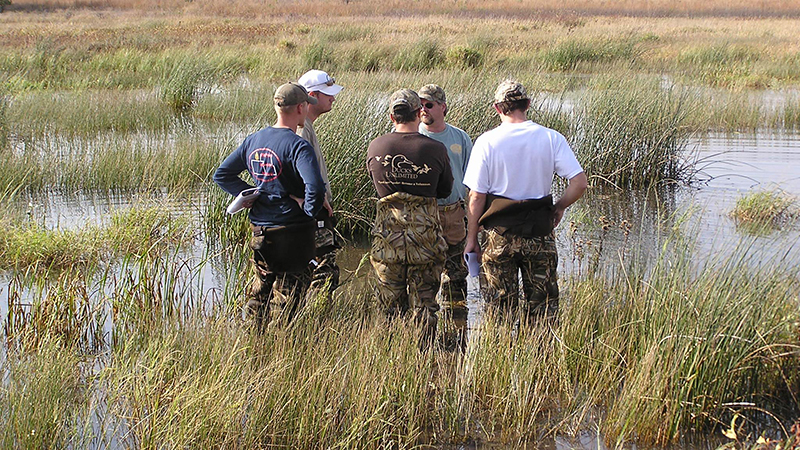
He became used to teaching college students, and when a position opened to teaching full-time, he transitioned to the role. He now teaches about 230 students a year at his undergraduate alma mater. Parts of that experience remain a bit surreal.
"I'm teaching one of the courses that my old advisor, Ron Case, was teaching when I was here," he said. "Sitting and listening to Ron Case back in the day, I never thought I'd be doing this thing that he was doing."
Last May, he saw his first group of students he taught as freshmen graduate. He said it was fun watching them come to the university as students and head out as professionals.
He also expressed pride in his graduate students and their accomplishments, like working as a team to get papers published.
"I'm proud of being able to work with those individuals to get some of that information out there to the scientific community or even the public," he said. "It's not the fact that you get this publication in your name. It's more of that satisfaction of accomplishing something as a team or a group."
The director of the School of Natural Resources said Vrtiska's work with students and stakeholders has especially made him deserve the Early Career Faculty Award.
"Mark has grasped his faculty role in the School of Natural Resources with energy for research and passion for our students," Powell said. "He has engaged our stakeholders to assist designing learning experiences that connect students to employers and provide lasting training and skills."
Vrtiska said his short-term goal for the future is to spend the next three or four years helping his current graduate students finish their degree work. Off work, he has resumed hunting upland game birds, this time with a dog and grandchildren.
"I'm doing a lot of that anymore, which I've enjoyed," he said. "I hope that they have the same opportunities I've had."
